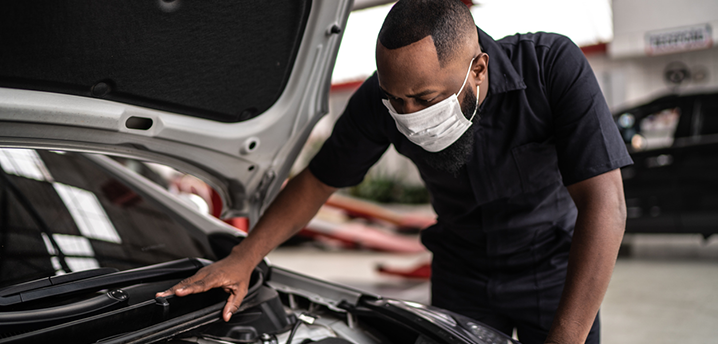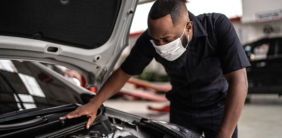Addressing car maintenance tasks during the pandemic is a wise move, even if you’re not driving much.
For the past few weeks, the entire country has been left in a state of limbo due to the coronavirus pandemic. With schools and many businesses closed, the majority of us are stuck at home for the foreseeable future, too.
Just because we aren’t spending as much time behind the wheel, though, doesn’t mean there aren’t still important vehicle tasks that we should — or could — be knocking out. Some of them will help us get ahead on basic car maintenance for the year, while others could potentially save us from very pricey repairs.
Keeping up With Basic Car Maintenance During the Pandemic
Thanks to recent stay-at-home orders, closures, and social distancing requirements, we have all seen our driving habits affected to some extent. And if you aren’t still commuting to work, car care tasks might have (understandably) fallen completely off your radar.
However, even if your vehicle is just sitting in the driveway, its maintenance is still important as ever. After all, you’re going to need your car again at some point (hopefully soon), especially as state mandates are starting to be lifted and businesses are reopening.
By leaving your car unattended for weeks (or months) at a time, you run the risk of certain issues cropping up. Some may be simple annoyances while others have the potential to turn into extensive repairs.
Let’s take a look at the car care tasks you should still keep up with — even in the midst of a pandemic — and what sort of problems could arise from their neglect.
Basic car maintenance to-dos
Whether you are still driving to work or your car hasn’t moved in weeks, you should create a list of both weekly and monthly vehicle tasks. Knock these tasks off now and then again at regular intervals depending on how often you’re getting behind the wheel.
You can use this list to build a maintenance schedule that will be helpful through the quarantine and beyond.
Top off fluids. Between engine oil, transmission fluid, power steering fluid, windshield wiper fluid, coolant, and even brake fluid, there are a lot of liquids that keep your car running. Check their levels and top them off if needed — your local automotive store will have great, affordable options.
Check tire pressure and adjust as needed. Warmer weather is upon us, which is a good time to be checking your tire pressure anyway. As the hot months hit, you may need to let some air out of your tires; in the fall and winter, you may need to add more. Grab a cheap tire pressure gauge to see where your tires stand, and add some air at the local gas station if you’re low… this will not only keep you safer, but also help your tires to last longer.
Add fuel injector cleaner to your gas tank. If you’re still driving your car regularly, this may be a good time to add a fuel injector cleaner. Used every 10,000 miles or so, this treatment can keep your fuel injectors clean and help your engine run smoother.
Change air filters. Your vehicle has at least two air filters: one for the engine and one for the cabin. If these haven’t been changed in a while, now is a good time to do it… especially right now with all of the springtime pollen in the air!
Change the oil and filter. While most of us grew up hearing that we should change our oil every 3,000 miles or three months, the truth is that modern vehicles can go a bit longer. However, if it’s been more than 5,000 miles since your last oil change — or at least six months — this may be a good time to cross that off the list.
Monitor brake pads. Unless your brakes are noisy or slow to respond, you may not know how worn the pads actually are. However, your local mechanic can take a look and let you know how long you have until they need to be changed out. Many shops are even offering no-contact vehicle pick-up/drop-off options, to keep you and your family even safer.
Check tire tread and wear patterns. Keep an eye on your tires’ tread depth; a balding tire can be a major safety hazard, especially on a wet road. You’ll also want to watch for uneven tread wear, such as a tire that seems to be wearing more on one shoulder, as this can indicate an alignment and/or inflation issue. And of course, be sure to rotate those tires regularly.
Change out windshield wiper blades. Smudgy windshield wipers can be a real hazard for drivers, so check your blades often and replace them whenever the rubber becomes worn. (PSA: This is something even newbies can learn to do in a few minutes!)
Clean and disinfect. Keeping your car clean and clutter-free is not only nice, it also helps protect your vehicle’s value. Wipe down high-touch surfaces (like your steering wheel and door handles) with an approved disinfectant, throw away trash, clean and condition leather seats, and vacuum carpets… your car will be feeling brand new in no time. If you are still commuting to work or just venturing out to the store on occasion, you may want to take it a step further by disinfecting your car to kill the novel coronavirus and other germs.
Some of these tasks will need to be done weekly while others might be monthly or even quarterly jobs. Though you’re not driving as much right now (if at all), getting into a good routine with your car’s care can help you avoid bigger issues down the line.
Pandemic Car Maintenance Tips If You’re Not Driving
Many of these to-dos may seem overkill if you’re not driving regularly right now. And honestly, you might even lack the motivation (or time) to worry too much about your car.
However, you need to at least make certain tasks a priority. These simple chores take only minutes, but might be all it takes to save you from an expensive — and often, preventable — repair.
Use your battery on occasion. You may not have a need to leave the house right now, but you should still be starting your car often (if not driving around a bit), just to keep the battery healthy.
Letting your car sit for too long may drain the cells of your battery, which can sometimes weaken it permanently. This is easily remedied with occasional use.
Keep the tires moving. Rubber needs to move regularly in order to keep from becoming brittle. If you’re letting your car sit in one place for weeks or months on end, it could be affecting the life (and safety) of your tires.
Be sure that you’re driving around once in a while to help prevent issues such as dry rot or flat spotting, even if it’s just a few miles a week. If you and the family are feeling cooped up, find a scenic drive near you and get some fresh air in the process.
Save your wiring from pests. Did you know that rodents such as mice are notorious for eating through the wiring on vehicles? It’s true! And while it could happen to anyone, it’s much more likely to happen if your car is sitting unattended for weeks at a time.
Be sure that you are frequently checking on your vehicle, starting the engine, and even inspecting it for signs of damage (or curious critters). If you spot anything, you may be able to avoid your vehicle’s wiring from becoming a snack by using certain deterrents.
Are Mechanic Shops Closed During the Pandemic?
On March 19, the Department of Homeland Security released a memorandum detailing which services and industries are deemed essential during the COVID-19 response, and therefore allowed to stay open. That list of essential services includes automotive repair and maintenance facilities, so the local shop down the road and your favorite dealership are both allowed to operate right now.
With fewer drivers on the road and everyone social distancing, these mechanic shops may have instituted limited hours or by appointment only. Of the shops that are open, many are offering no-contact options for vehicle pick-up and drop-off, too. Be sure to call before you go to learn your options.
What about the DMV?
Many states have closed regulatory offices, such as the Department of Motor Vehicles, in response to the pandemic. So what happens if you need to title a new car, renew your registration/inspection, or replace a driver’s license?
Well, some states have decided to preemptively extend certain deadlines and expiration dates, to account for closed branch offices. Rather than venturing out to get your car’s inspection sticker renewed or worrying about an expiring registration sticker, you may be able to rest easy with a grace period.
For instance, Texas has announced that requirements for vehicle titling, inspection, and registration have been temporarily suspended. You’ll have up to 60 days to complete these tasks once the emergency orders have been lifted. In the meantime, though, you don’t have to worry about standing in lines or finding an open office.
Be sure to check the announcements for your state so you know what has been waived and for how long.
Keep Your Car Running Longer, Too
If you’re anything like me, you probably put off certain car-related duties simply because it’s difficult to find the time. Whether it’s an overdue oil change, a squeaky belt, or the recall notice you got from the manufacturer, it can be difficult to schedule preventative care around your usual schedule.
Of course, there aren’t too many silver linings when it comes to the coronavirus pandemic. If you’ve also had some of the bigger vehicle tasks on your to-do list, however, this might be just the right time to check that box.
Scheduled maintenance
When is the last time you took your vehicle in for milestone maintenance, such as a lengthy 50,000- or 75,000-mile service? While these are more expensive than your basic oil change and tire rotation, they address key systems of your car that are prone to wear or damage.
These appointments also take quite a bit longer to complete than your usual oil change. Now is a great time to drop your car off at the shop and cross one of those overdue milestone services off the checklist, especially if you aren’t commuting in to work.
Stop little problems before they get big
Some states have reopened while others are developing their strategy. Wherever your state falls in that spectrum, it’s safe to say that your car won’t be stuck in the driveway forever. That makes this a good time to head off any of those little annoyances, so they don’t leave you stranded later on.
If it’s been a while since you had your battery tested, haven’t gotten an alignment since you bought the vehicle, or your brakes squeal the moment you touch the pedal, make an appointment at your favorite shop.
After all, an ounce of prevention is worth a pound of cure, even when talking about cars. Changing a worn serpentine belt could cost you $75 today, or it could cost you hundreds for a cross-town tow later on when that belt snaps.
Check for recalls
If you have any outstanding recall notices on your vehicle, take advantage of this time and drop it off at the dealership for repair. Some recall repairs require a day or two in the shop, so knocking it out now — while you aren’t commuting to work or school — is wise.
Taking the DIY Approach to Car Maintenance
If you are feeling ambitious, you may want to take your car maintenance during the coronavirus pandemic up a notch. In that case, consider taking the DIY approach on a few tasks.
There are so many great online resources when it comes to vehicle upkeep. YouTube is an excellent resource, especially since you can find step-by-step videos for almost every make and model… sometimes down to the specific year of your car.
You can also consult your owner’s manual, which may have instructions for some of the basic maintenance requirements for your vehicle, or browse forums such as Reddit. Some online shops and automotive websites may offer instructional videos, too, along with selling affordable parts and accessories that you may need.
You can start out small, learning how to check things like your oil level and tire pressure, or changing out your windshield wiper blades. After you’ve taught yourself and done these things once, you’ll never want to pay a shop to do them again!
If you really want to rack up the savings (and boost your car care confidence level), you can learn how to switch out your own air filters, replace headlight bulbs, and even change your own oil. And while it’s not necessarily a maintenance task, now is also a good time to learn how to change a tire, if you don’t already know.
Final Thoughts
While the coronavirus has disrupted life as we know it, it’s also forced us to slow down a bit. One of the benefits to this is that we may be able to knock out some tasks that we simply haven’t had enough time for lately… and taking care of our cars should be on that list.
Even if you’re only driving to get groceries once a week, keeping your car in peak condition is important. Once “normal” life resumes, you’ll be so glad you did — and you may even come out of quarantine with a few brand new skills.
About The Author
RateGenius
A better way to refinance your auto loan. RateGenius works with 150+ lenders nationwide to help you save money on your car payments. Since 1999, we've helped customers find the most competitive interest rate to refinance their loans on cars, trucks, and SUVs. www.rategenius.com
;)





